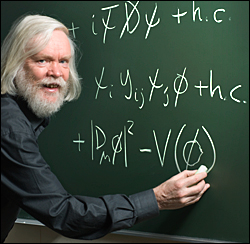Pioneering Physicist John Ellis to Speak at Brookhaven Lab on “Answering Gauguin’s Questions” May 26
April 26, 2010
UPTON, NY — John Ellis, a theoretical physicist from CERN, the European laboratory for particle physics in Geneva, Switzerland, will give a BSA Distinguished Lecture titled “Answering Gauguin’s Questions: Where Are We Coming From, Where Are We Going, and What Are We?” at the U.S. Department of Energy’s Brookhaven National Laboratory at 7 p.m. on Wednesday, May 26, in Berkner Hall.
BSA Distinguished Lectures are sponsored by Brookhaven Science Associates, the company that manages Brookhaven Lab, to bring topics of general interest before the Lab community and the general public. The lecture is free and open to the public. Visitors to the Laboratory age 16 and over must bring a photo ID.
Ellis is a long-term research leader at the Large Hadron Collider (LHC) at CERN, where high-energy experiments have now started and will take physics into a new realm of energy and time. This research also will address the physics analogues of the simple yet profound questions of human existence posed by French artist Paul Gauguin in his famous 1897 painting.
The knowledge of matter revealed by the current reigning theory of particle physics, known as the Standard Model, still leaves open many basic questions, for example: What is the origin of the matter in the Universe, how does its mass originate, what is the nature of the dark matter that fills the Universe, and are there additional dimensions of space? The answers to these questions may set the stage for future experiments beyond the scope of the LHC.
Ellis has been recognized for fostering the international character of CERN. He has interacted with physicists and diplomats worldwide. He also has given lectures around the globe, in many cities and several languages. His primary research interests focus on the phenomenological aspects of particle physics, but he has also made important contributions to astrophysics, cosmology, and quantum gravity.
Ellis earned his Ph.D. in theoretical (high-energy) physics from Cambridge University. Among his many honors, Ellis was awarded the Maxwell Medal and the Paul Dirac Prize by the Institute of Physics in 1982 and 2005, respectively, and is an Elected Fellow of the Royal Society of London.
2010-11123 | INT/EXT | Newsroom










